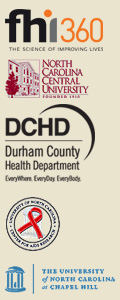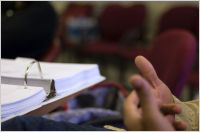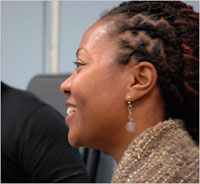
| Project News and Events | |
| Other Events and Activities | |
| Resources | |
| Get Involved | |
| Contact Us | |

|
|
Methodology
LinCS 2 Durham brings together a wide array of organizations and people who care about the impact of HIV in Durham: people who live and work here, people who provide HIV-related services, local scientists working on HIV, people who volunteer for HIV-related research studies, and the community advocates and policy-makers who are working for positive change for HIV prevention and services. These people are considered to be “stakeholders” and are represented through our CAB-Partnership (newly titled Collaborative Council). Together we want to identify and pursue the best HIV-prevention research opportunities for Durham’s Black community.
Communities affected by HIV/AIDS are rarely asked to help decide what kind of HIV-prevention research they most need. This is one of the innovative aspects of LinCS 2 Durham. We have designed the project so we can learn from our experience and share what we learn with others.
 |
| Photograph by Lisa Marie Albert |
LinCS 2 Durham draws on established principles for community-based participatory research: recognizing the importance of community identity, building on community strengths and resources, promoting co-learning, staying grounded in local realities, involving all partners equitably, and making a long-term commitment.
An important part of the LinCS 2 Durham project will be an on-going evaluation of how well the partnership between scientists and community members works. This means that we will take time to reflect on what we are learning together, what is working, and what is not working. We will use those reflections to decide how to go forward with our work. We will also share what we learn to help other communities and scientists to build effective partnerships.
 |
| Photograph by Lisa Marie Albert |
We are using what is called an ethnographic team approach to learn about Durham, the Black community, and the various HIV stakeholder groups. Ethnography refers to the study of people in groups and communities. In ethnography, the researchers are the learners and the members of the community are the teachers. The first goal of our ethnographic work is to reach out to and learn from the diverse HIV stakeholder groups in Durham and especially in Durham’s Black community. An important part of an ethnographic approach is to both observe and participate in the life of the community. We will also conduct interviews and focus groups with people.
Because young people are often at greatest risk for HIV, we are especially interested in learning about their lives. What does community mean to them and how do they experience community? Where do they find strength? What are their toughest challenges? What would they like to see happen to help prevent HIV in Durham’s Black community? To answer these questions, we are planning a survey among young Black adults 18-30 years old. We will then use the results of the survey to improve and strengthen our partnership with the younger generation.
For the LinCS 2 Durham project to be effective, this broad stakeholder partnership needs to include a way for people to learn about what it means to be a part of HIV prevention research. Thus another goal of LinCS 2 Durham is to develop an HIV Prevention Technologies Research Literacy Curriculum and evaluate the effectiveness of this curriculum.
| Contact the Webmaster | Feedback Form | Subscribe to Our E-newsletter | Terms of Use | Home |